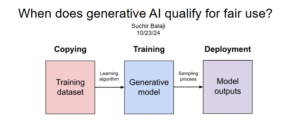Suchir Balaji’s sudden death has sent shockwaves through the tech and AI communities. A former OpenAI researcher, Balaji’s final blog post—an unflinching critique of OpenAI’s use of copyrighted data—has gone viral, adding gravity to his untimely passing. His insights illuminate critical ethical, legal, and societal issues surrounding artificial intelligence, highlighting a growing concern over the unchecked expansion of AI technology.
Introduction
The sudden passing of 25-year-old Suchir Balaji, a former researcher at OpenAI, has left many grappling with questions about his life, his work, and his bold critique of one of the most influential AI companies in the world. Found dead in San Francisco earlier this week, Balaji leaves behind a legacy marked by his significant contributions to AI research and a searing indictment of OpenAI’s business practices. His final blog post, which went viral after his death, is a scathing critique of how AI companies allegedly exploit copyrighted materials and disregard the ethical considerations of their technologies.
Who Was Suchir Balaji?
Balaji, an Indian-American, graduated from UC Berkeley in 2020 with a degree in computer science and joined OpenAI shortly thereafter. He was part of the elite team working on GPT-4, the generative AI model that revolutionized natural language processing. Initially drawn to AI’s transformative potential, including its ability to address societal challenges like curing diseases an

d combating aging, Balaji spent four years at OpenAI. However, over time, he became increasingly disillusioned with the company’s practices, particularly its data usage policies.
In his blog post, Balaji expressed regret about how the company was leveraging copyrighted materials to train its AI systems, alleging that such actions violated U.S. copyright laws and harmed content creators. He argued that these practices not only jeopardized the commercial viability of businesses but also eroded the integrity of the internet itself.
Key Allegations of Balaji Against OpenAI

Balaji’s post outlined several grave concerns:
- Use of Copyrighted Data Without Consent:
He claimed that OpenAI’s models, including ChatGPT, relied on massive datasets that included copyrighted materials scraped from the internet without proper authorization. Balaji asserted that these practices violated the “fair use” principle and undermined creators’ rights. Link to his blog is provided at the end. - Economic and Ethical Concerns:
According to Balaji, generative AI outputs, which often closely mirror the original copyrighted material, are eroding the financial sustainability of authors, artists, and publishers. By repurposing such data, AI models are effectively competing with the very individuals and organizations that generated the content in the first place. - A Call for Regulation:
Balaji strongly advocated for government intervention and stricter AI regulations. He argued that the lack of oversight had allowed companies like OpenAI to operate in legally ambiguous ways, causing harm to creators, consumers, and broader digital ecosystems.
The Broader Context: Ongoing Legal Challenges
Balaji’s concerns are not isolated. OpenAI has faced a slew of lawsuits over its data collection practices. Notably, The New York Times sued OpenAI and Microsoft earlier this year, alleging that their content had been used without permission to train AI models. High-profile authors like George R.R. Martin and John Grisham, as well as organizations like the Center for Investigative Reporting, have also filed lawsuits accusing OpenAI of copyright infringement. These legal battles underline the growing tension between AI companies and content creators.
While OpenAI has defended its practices by citing “fair use” and the need for innovation, critics argue that the company’s actions exploit legal loopholes at the expense of individuals’ intellectual property rights.
Industry Response and Public Reaction
The tech and AI communities have been polarized in their responses to Balaji’s revelations. Some view him as a whistleblower shedding light on unethical practices, while others question the feasibility of stricter regulations in a rapidly evolving industry. OpenAI, in its defense, has emphasized the importance of publicly available data for innovation, stating that their practices align with legal precedents.
Balaji’s death has added a layer of poignancy to the debates surrounding AI ethics. While the exact circumstances of his passing remain under investigation, many have speculated about the immense pressure he faced as a researcher navigating the ethical complexities of cutting-edge AI development.
A Pivotal Moment for AI Ethics
Balaji’s revelations come at a time when governments worldwide are grappling with how to regulate AI. The European Union, for instance, is moving forward with its AI Act, which aims to establish comprehensive rules for AI development and deployment. In the U.S., however, efforts to regulate AI remain fragmented, with no overarching federal legislation in place.
Balaji’s call for accountability underscores the urgent need for policymakers to address these challenges. His critique goes beyond OpenAI, pointing to systemic issues in the AI industry, including the commodification of data, lack of transparency, and the ethical dilemmas posed by generative AI technologies.
The Legacy of Balaji
Despite his young age, Balaji’s work and critique have left a lasting impact on the AI community. His final blog post is not just a condemnation of OpenAI but also a wake-up call for the entire industry. It serves as a stark reminder that while AI holds incredible potential, its development must be guided by ethical considerations and robust legal frameworks.
In the days following his death, Balaji has been remembered as a passionate advocate for responsible AI development. His tragic passing has spurred renewed conversations about the need for transparency, accountability, and humanity in the tech industry.
Conclusion
Suchir Balaji’s life and work epitomize the complexities of developing transformative technologies in a world where ethics and profit often collide. His final message is a clarion call for the industry and society at large to rethink the trajectory of AI development. While his death is a significant loss, the conversations he ignited will likely shape the future of AI ethics and policy.
https://www.bbc.com/news/articles/cd0el3r2nlko
Link to Suchir balaji’s blog: https://suchir.net/fair_use.html

